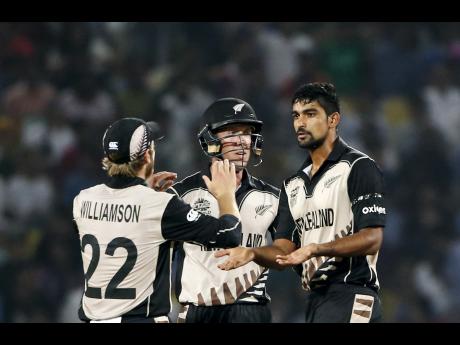Tony Becca: The minnows of cricket going well
The International Cricket Council's (ICC) T20 World Cup got under way in style this past week with Chris Gayle of the West Indies, New Zealand, and England setting the stage for some glorious action to come.
T20 cricket is known for its excitement, especially for its power-hitting and acrobatic catching, and the 2016 T20 World Cup needed no kick-start.
Gayle got the proceedings under way with a scintillating and glittering innings of 100 runs off 47 deliveries with 11 towering sixes against England; New Zealand followed up by handing stinging defeats to India and Australia; and England redeemed themselves and stayed in the race with an impressive record-breaking run chase against South Africa.
For Gayle, it was nothing new and, therefore, not surprising. For New Zealand, however, victory and over India and Australia, especially one behind the other, and so quickly at that, was almost surprising, and so, too, was England's grand recovery after falling so easily to the West Indies.
New Zealand first knocked off India, scoring 126 for seven, and then nailing India for 79 in 18.5 overs before taking care of Australia, first by scoring 142 for eight and then by limiting Australia to 134 for nine.
The real excitement, however, came on Friday morning (local time) when South Africa raced to 229 for four after scoring 58 run off 4.2 overs before falling to England, who dashed to 230 for eight after making a rousing start of 44 off just two overs.
Apart from those four interesting and exciting matches, however, the 2016 tournament belongs to the minnows.
Qualifying round
With the tournament featuring a qualifying round which saw six minnows, Affiliates and Associates members, Ireland, The Netherlands, Scotland, Afghanistan, Oman, and Hong Kong, plus two Full Members, Bangladesh and Zimbabwe, playing against each other in two groups, with the two winners going through to the Super 10 stage, the qualifiers were quite interesting and produced some fairly good, but exciting cricket.
Ireland and The Netherlands, the usual upsetters in ICC tournament, were expected to do well but not to top the groups and advance in the tournament, not with the presence of Bangladesh and Zimbabwe.
Bangladesh did make it to the tournament proper, but Zimbabwe did not, and with rain forcing two no-results, both Ireland and The Netherlands who lost points due to the rain, failed to go through.
The surprise teams to make it to the Super 10 were Oman who after defeating Ireland with two deliveries to spare, lost easily to Bangladesh and failed to qualify, and Afghanistan, who defeated Zimbabwe in January, beat Zimbabwe and won all three qualifying matches to reach the Super 10.
While the batting of the minnows was highlighted by some towering sixes, and barring a few who are exposed to first-class cricket, reminded more of the 'curried goat' variety, the bowling was fairly good, only lacking at times in consistency of line and length.
The ground fielding also was generally good, but for lapses by Afghanistan against Sri Lanka. The catching, however, was brilliant, and four catches to remember were by one Michael Leask of Scotland to get rid of Richmond Mutumbami of Zimbabwe at long off; one by Sikander Raja of Zimbabwe at cover to remove Kyle Coetze of Scotland; one by Zeeshan Masqood of Oman at short extra-cover to take care of Paul Sterling of Scotland; and what must be the catch of the tournament so far, Gary Wilson's effort on the square-leg boundary to remove Aamir Ali of Oman.
FAILED TO SAVE
As good as that catch was, it failed to save Ireland.
For years now, ever since the coming of the World Cup and the T20World Cup tournaments, the weaker teams, the minnows, have been calling for greater opportunities, for more cricket so that they can improve their play.
Despite the performances of teams like Ireland and Netherlands, however, their calls have fallen on deaf ears.
As we laud the performances of Oman and Afghanistan, who have joined Ireland and The Netherlands as upsetters, we think of teams like Kenya, East Africa, Papua New Guinea, Namibia, America, and Argentina, among others, and what has happened to them.
In 1969, the West Indies went to Ireland and were badly beaten, albeit in a friendly match; in 1992, the West Indies lost Kenya in the World Cup; in 2003, Sri Lanka lost to Kenya; in 2007, Pakistan lost to Ireland in the World Cup; in 2007, England lost to The Netherlands in the T20 World Cup in 2009; Ireland beat Bangladesh in 2009 in T20 World Cup; and England again lost to The Netherlands in the T20 World Cup in 2014.
"I think we are as good as Zimbabwe," said Preston Mommsen, the captain of Scotland, although he lost a close match to them this time around. William Porterfield of Ireland has always complained about the lack of opportunity, and Mommsen also lamented the fact that Scotland had only two matches against Full members recently, one against Australia in 2013 and one against England in 2014.
The minnows of cricket deserve better than this. They deserve an opportunity, an opportunity to become as good as the West Indies were before they became the champions of the world in all three versions.

